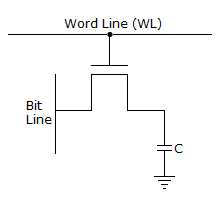ECE :: Digital Electronics
-
In a T flip-flop the output frequency is
-
The access time of ROM using bipolar transistors is about
-
In LIFO
-
In RAM, all the information can be obtained at the output with
-
A 1 ms pulse can be converted into a 10 ms pulse by using which one of the following
-
In the DRAM cell in the figure is the Vt of the NMOSFET is 1 V. For the following three combinations of WL and BL voltages.

-
Assertion (A): The carry look ahead adder is very fast
Reason (R): The carry look ahead adder generates the carry and sum digits directly.
-
The factors which govern fan out of CMOS gates are
-
Which of the following subtraction operations do not result in F16?
- (BA)16 - (AB)16
- (BC)16 - (CB)16
- (CB)16 - (BC)16
- (CB)16 - (BC)16
- (BA)16 - (AB)16


 Whatsapp
Whatsapp
 Facebook
Facebook

